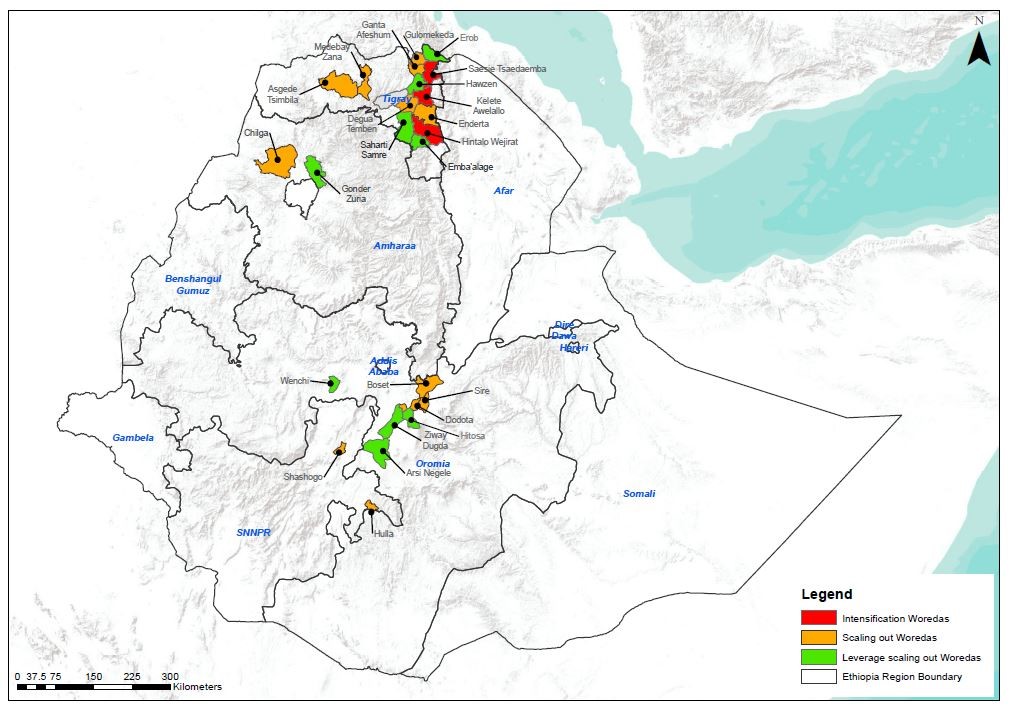Ethiopia
Regreening Africa builds on past successes in land restoration in Ethiopia, such as the Farmer-Managed Natural Regeneration programs in Humbo, Sodo, Abreha Weatsbha and Medebay Zana areas.
Successful small-to-medium-scale agroforestry projects restored degraded land, improving food security in Southern Nations, Nationalities, and Peoples’ Region (SNNPR), Tigray, Oromia and Amhara regions. Regreening Africa will increase the scale of these successes.
Highlights
Regreening targets
200,000 hectares
120,000 households
Sites
Northern Region: Tigray and Amhara
Central Region: Oromia
Southern Region: Southern Nations, Nationalities, and Peoples’ Region (SNNPR)
Total of 25 local governments (‘woredas’). Direct expansion of scale will be conducted in 15 woredas and leveraging of practices in 10.
Partners
Catholic Relief Services and partners (Ethiopian Catholic Church Social and Development Commission Adigrat; Ethiopian Catholic Church Social and Development Commission Mekele branch, Ethiopian Catholic Church Social and Development Commission Dera Branch)
World Vision Ethiopia
ICRAF Ethiopia
Approaches to reversing land degradation
- Intervention through farmers’ networks and community-based organisations
- Support farmer-managed natural regeneration, community and conservation groups and rural resource centres
- Supply high-quality planting material and facilitate tree planting to support private and government nurseries
- Hold farmers’ field days, experience-sharing farm visits, farmer-to-farmer extension and volunteer, expert farmers
- Influence policy, practice and investment decisions by engaging decision-makers, governments and communities at all levels
- Conduct regular meetings to secure interest and synergize networks
- Engage in print, audio and digital communication to spread regreening information
Project sites
The project will be implemented in 25 woredas (districts) across four regional states:
- Tigray
- Oromia
- Southern Nations Nationalities, and Peoples’ Region (SNNPR)
- Amhara
Direct scaling-up will be conducted in 15 woredas and leveraging scaling-up practices will be conducted in 10 woredas.

Expected impact
- Regreening innovations adopted by at least 120,000 farming families in 25 woredas
- Improved and diversified livelihoods
- At least 200,000 hectares of degraded landscapes rehabilitated
- Transformed behaviour and practices of farmers and influential stakeholders at multiple levels
- Implementing partners and stakeholders equipped with new knowledge, skills, tools and resources to effectively promote regreening practices
Contact details
Catholic Relief Services (CRS)
Malefia Tadele
Project Manager
Malefia.Tadele@crs.org
World Vision (WV)
Habtamu Regasa
Project Manager
Habtamu_Regasa@wvi.org
World Agroforestry Centre
Kiros Hadgu
Country Manager
K.Hadgu@cgiar.org
1 The Global Mechanism. (2007). Increasing finance for sustainable land management. The Global Mechanism of the UNCCD—Via Paolo di Dono 44—00142 Rome, Italy. Available online at www.global-mechanism.org. Accessed 31 May 2015.
2 Gebreselassie S., Kirui O.K. and Mirzabaev A. 2016. Economics of land degradation and improvement in Ethiopia. PP 401-430. In Nkonya E., Mirzabaev A and Von Braun J (Eds) Economics of land degradation and improvement-A global assessment for sustainable development. SpringerOpen, New York.
